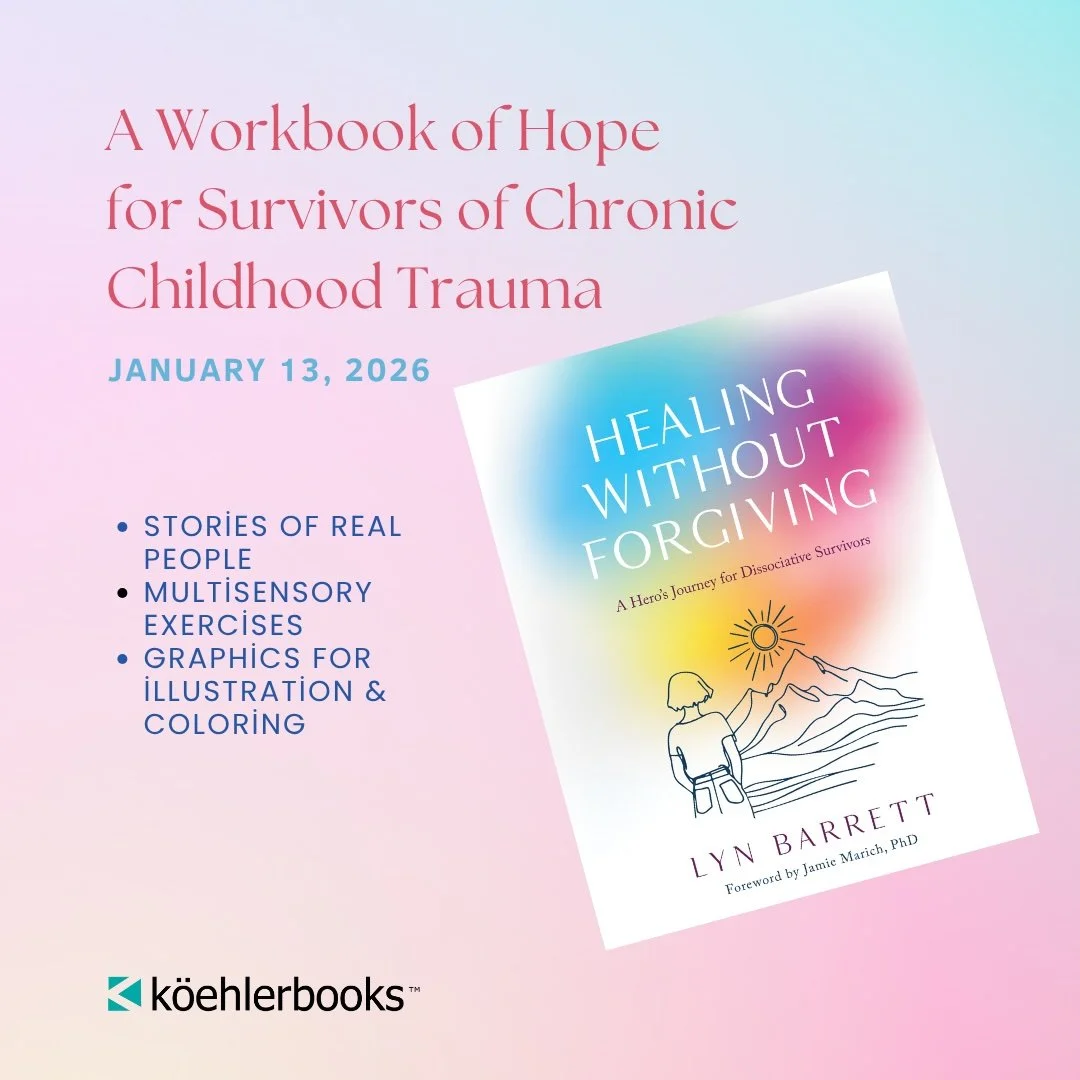Forgiving Yourself & Friends
Healing Without Forgiving: A Hero’s Journey for Dissociative Survivors will be published on January 13, 2026 and pre-orders are now open! To give you a sneak preview, I’m printing occasional excerpts from the workbook. Today’s excerpts come from two short chapters: Chapter 3: The Initiation under the subheading Loving Yourself, and Chapter 4: Companions under the subheading Forgiving Friends & Family. Many people shared their thoughts and ideas with me and generously gave me permission to share them with you. This excerpt includes a short quote from Judie.
➰➰➰
Forgiving yourself is a simple phrase that refers to the elusive task of loving yourself. As an infant, toddler, or adolescent, you may have internalized the message that you were unlovable and, in many cases, “to blame” for your family dysfunction in general and your own abuse in particular. You may have grown up believing you were defective and responsible for your parents’ mistakes, your siblings’ mistakes, as well as your own mistakes. Often, your love was contingent on meeting adult needs. Probably you developed a worldview that assumed you were unworthy of love. You might as well have a sign on your back that says, “Throw your disgust on me—I can take it!” Only you can’t take it. Carrying other peoples’ projections is hard for anyone, let alone a child, let alone many inner children …
Forgiving yourself is a critical part of your healing process. The foundation for forgiving yourself is loving yourself. Janina Fisher, clinician, researcher, and author of Transforming the Living Legacy of Trauma, says that “healing is the moment when we accept and forgive ourselves—the moment when we see that small child who we once were through the eyes of the compassionate adult we have become.”
➰➰➰
Everyone is human and makes mistakes, so a part of your healing work involves accepting these imperfections in yourself and others. Coming to a realistic understanding of who in your life is trustworthy and who does not deserve your trust will pave the way for you to forgive friends who prove themselves over time.
After many years of treatment, Judie, whom we met in chapter 2, still struggles with discerning whom she can trust: I’m not totally confident in this since I had so many years of being “tricked” by my father and others. But I “hope” in the trust that I do give to certain people. And some, like my brothers for instance, I basically understand how much I can trust them. I have a hard time creating boundaries because I have never been given the right to do that. But I do keep trying and growing in that area. And where I have done so, it has essentially been good. Those who I put hope in trusting, I find that I can also forgive. If I can trust them, there is usually a certain amount of respect and even love, and I want to forgive them if it becomes necessary. I want people I can finally truly trust. I don’t want to lose them or run from them. I want to learn where it is right to trust and forgive.
Forgiveness, in the case of friendships, is a part of healing relationships, a part of becoming confident that you can recognize the nature of your friend’s character, and a part of your growing maturity. You learn how to sit in the uncomfortable space of not knowing, observing, and then knowing after taking time to gather evidence. To heal from your trauma, you need to work through your triggers and use your creative mind to discern who is worthy of your forgiveness and who is not.
📫 In our last newsletter, I asked you if you ever think the abuse was your fault. At some deep level, do you know that it was NOT your fault? Can you tell yourself that it’s NEVER the child’s fault? Judie, above, responded with these thoughts about helping others understand that it was not our fault. She sent a portion of the last newsletter to a friend and reflects:
Its sooo sooo difficult to get singletons to grasp that we just plain don't think and reason and react and function like they do. And when you come from a ritual abuse background, with both organic and programed dissociation, then its even harder. And even those w/organic DID don't understand those of us from RA backgrounds bcz even they don't understand what it means to have "programmed" dissociation. Ritual Abuse consists of both...organic (natural) and programmed dissociation. So things like forgiveness, daily functioning, and etc, are often a mess to figure out inside. And when people don't take the time to understand us, especially those of us w/programmed dissociation, life is extremely difficult and complicated, and compounds the pain thats already there, as well as the programs and issues we struggle with moment by moment.
Thank you, Judie, for sharing a little bit about the world of RA/MC (ritual abuse and mind control). We are all carrying suffering and pain in different ways. It’s helpful for all of us to hear about the frustrations you feel, whether we experienced RA/MC or not, because it enlarges our empathy quotient.
With this blog post, I’ll ask a new question. How does your trauma history impact whether you can forgive yourself or friends who are otherwise trustworthy? What triggers do you need to work on in order to do that?
Email me at lyn@lynbarrett.com with your thoughts and I’ll share them in my next blog post
PRE-ORDERS ARE NOW OPEN ON AMAZON AND BARNES & NOBLE !
🕊️
You are precious in my sight, and honored, and I love you.
~ Isaiah 42: 4
Lyn


